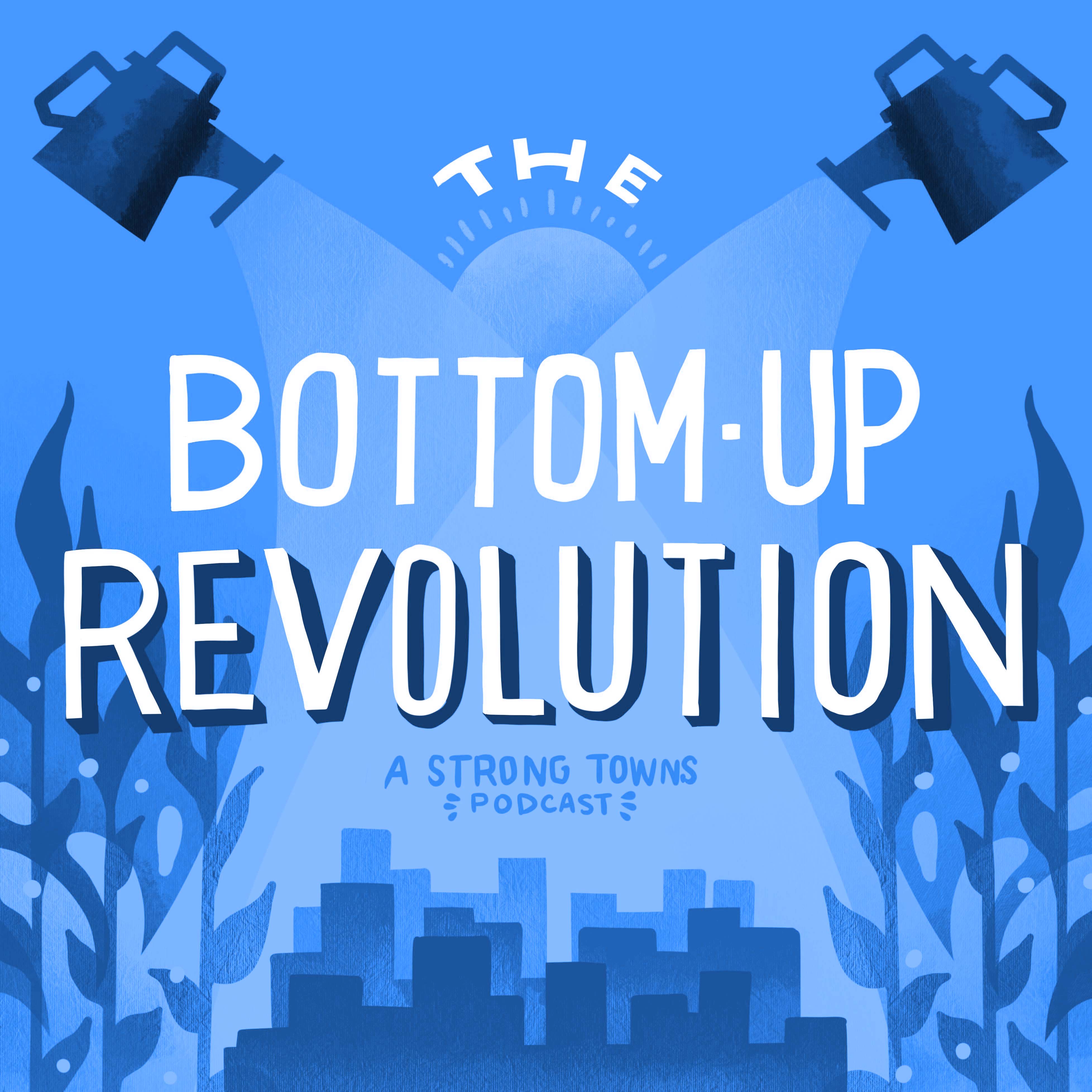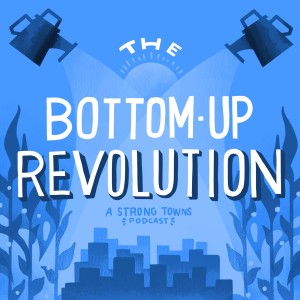
561.9K
Downloads
301
Episodes
The Bottom-Up Revolution features the stories of the Strong Towns movement in action. Hosted by Tiffany Owens Reed and Norm Van Eeden Petersman, it's all about how regular people have stepped up to make their communities more economically resilient, and how others can implement these ideas in their own places. We’ll talk about taking concrete action steps, connecting with fellow advocates to build power, and surviving the bumps along the way—all in the pursuit of creating stronger towns. Each episode features a Strong Towns advocate who is making positive change in their community.
Episodes

Tuesday Feb 25, 2025
Bottom-Up Shorts: How to Build Momentum as a Local Advocate
Tuesday Feb 25, 2025
Tuesday Feb 25, 2025
In this Bottom-Up Short, Norm is joined by Christian Schick, the leader of Strong Towns RVA, a Local Conversation in Richmond, Virginia. The group has built a lot of momentum in the past year, and Schick talks about how they did that in a productive and helpful way, particularly while juggling local elections.
ADDITIONAL SHOW NOTES
-
Strong Towns RVA (Linktree).
-
Norm Van Eeden Petersman (LinkedIn).
-
Do you know someone who would make for a great The Bottom-Up Revolution guest? Let us know here!

Thursday Feb 20, 2025
Mike Christensen: Bringing the Benefits of Passenger Rail to Utah
Thursday Feb 20, 2025
Thursday Feb 20, 2025
Mike Christensen is the executive director of the Utah Rail Passenger Association, where he works to educate the public and policy makers about the value of investing in passenger rail. He also serves on Salt Lake City’s planning commission, as well as the boards of the Utah chapter of the Congress for the New Urbanism, the Utah Transit Riders Union and the national Rail Passengers Association.
Christensen joins Tiffany Owens Reed on this episode of The Bottom-Up Revolution to discuss the benefits of passenger rail, including how it can lead to more productive land use, as well as his work advocating for better public transit outside of metropolitan areas.
ADDITIONAL SHOW NOTES
-
Local Recommendations:
-
Mike Christensen (Twitter/X)
-
Utah Rail Passenger Association (website)
-
Tiffany Owens Reed (Instagram)
-
Do you know someone who would make for a great The Bottom-Up Revolution guest? Let us know here!

Tuesday Feb 18, 2025
Bottom-Up Shorts: How To Capture the Rhythm of a City
Tuesday Feb 18, 2025
Tuesday Feb 18, 2025
Varsha Gopal is an architect from Chennai, India. She is putting Strong Towns ideas into action by starting conversations about what makes places thrive — what makes them special, sustainable and prosperous. On this episode of Bottom-Up Shorts, she joins Norm to discuss two research projects she recently conducted in her city and what they taught her about thriving cities, urban design and community engagement.
ADDITIONAL SHOW NOTES
-
Do you know someone who would make for a great The Bottom-Up Revolution guest? Let us know here!
-
Subscribe to The Bottom-Up Revolution on iTunes, Google Podcasts, Podbean or via RSS.

Thursday Feb 13, 2025
Maricela Sanchez: Applying Big City Lessons to a Small Town
Thursday Feb 13, 2025
Thursday Feb 13, 2025
Maricela Sanchez is a city council member and anesthesiologist from Prosser, Washington. She has lived in major cities all over the U.S., including Los Angeles, San Francisco and New York City. In today’s episode, she joins Tiffany to discuss how her travels and profession molded her perspective on what makes a town safe and resilient. They also discuss Sanchez’s role as a councilor, where she focuses on creating safe, walkable neighborhoods and improving active transportation.
ADDITIONAL SHOW NOTES
-
Local Recommendations:
-
Tiffany Owens Reed (Instagram)
-
Do you know someone who would make for a great The Bottom-Up Revolution guest? Let us know here!

Thursday Feb 06, 2025
Stanis Moody Roberts: Rallying a Community To Fight Highway Expansion
Thursday Feb 06, 2025
Thursday Feb 06, 2025
Stanis Moody Roberts is a business owner from the Portland, Maine area. For the past year he has been organizing locals to oppose a highway expansion that would have claimed eight acres of his land. He joins Tiffany on today’s episode of The Bottom-Up Revolution to discuss this journey and the progress his community has made — including how they convinced their town council to rescind support for the project and delayed construction by several years.
ADDITIONAL SHOW NOTES
-
Local Recommendations:
-
Tiffany Owens Reed (Instagram).
-
Do you know someone who would make for a great The Bottom-Up Revolution guest? Let us know here!

Tuesday Feb 04, 2025
Bottom-Up Shorts: How To Build Credibility and Effectivity as an Advocate
Tuesday Feb 04, 2025
Tuesday Feb 04, 2025
Welcome to this episode of Bottom Up Shorts! Today, Norm is joined by Andrew and Anna Carley, the leaders of Strong Towns Grand Rapids, a Local Conversation in Michigan. They discuss the progress they’ve made in advocating for policy changes in their city and how they became one of the go-to groups that city officials turn to when they’re considering policy changes.
ADDITIONAL SHOW NOTES
-
Strong Towns Grand Rapids (site).
-
Want to hear more from the Carleys? Hop on the Spring Local Motive Tour, where they’ll share their tactics for regional organizing and letter-writing campaigns.
-
Do you know someone who would make for a great The Bottom-Up Revolution guest? Let us know here!

Thursday Jan 30, 2025
Emily Hutcheson: Building a Culture of Bicycling
Thursday Jan 30, 2025
Thursday Jan 30, 2025
Emily Hutcheson is a bike advocate in San Antonio, Texas, and a mom of three. She joins Tiffany on this episode of The Bottom-Up Revolution to discuss her work improving bike infrastructure in her city. They discuss her path to advocacy, some of the initiatives she’s spearheaded, including a bike club and bike bus, and the response from the public and local officials.
ADDITIONAL SHOW NOTES
-
Local Recommendations:
-
Tiffany Owens Reed (Instagram).
-
Do you know someone who would make for a great The Bottom-Up Revolution guest? Let us know here!

Tuesday Jan 28, 2025
Bottom-Up Shorts: How To Incrementally Improve Your City's Zoning Laws
Tuesday Jan 28, 2025
Tuesday Jan 28, 2025
Spencer Coyne is the mayor of Princeton, British Columbia. As a proud Strong Towns member, he works to bring incremental development and community resilience to his city. Coyne joins this Bottom-Up Short to explain how he’s implementing the Strong Towns approach in Princeton, including how to incrementally reform a zoning code and how to do a lot with a small amount of funding.
ADDITIONAL SHOW NOTES
-
Connect with Spencer Coyne:
-
Do you know someone who would make for a great The Bottom-Up Revolution guest? Let us know here!

Thursday Jan 23, 2025
Thursday Jan 23, 2025
In this episode of The Bottom-Up Revolution, host Tiffany Owens Reed is joined by Ellie Riggs and Ryan Carter from Catawba Riverkeeper, a grassroots organization that preserves the waters of the Catawba-Wateree River basin in North Carolina.
They discuss stormwater’s effect on the environment, how it’s connected to parking reform and developers, and a new stormwater management bill that Riggs and Carter are introducing to the North Carolina state legislature in a few weeks. They also discuss Riggs and Carter’s experience with advocacy at the state level.
ADDITIONAL SHOW NOTES
-
Local Recommendations:
-
Tiffany Owens Reed (Instagram).
-
Do you know someone who would make for a great The Bottom-Up Revolution guest? Let us know here!

Tuesday Jan 21, 2025
Bottom-Up Shorts: How To Remove Parking Mandates in Your Downtown
Tuesday Jan 21, 2025
Tuesday Jan 21, 2025
In this episode of Bottom-Up Shorts, host Norm Van Eeden Petersman is joined by Michael Bassili, one of the leaders of Strong Towns Nanaimo, a Local Conversation group based in British Columbia, Canada. Bassili explains how his Local Conversation created a parking campaign that convinced their city council to vote 8-1 to eliminate parking mandates in their downtown.
ADDITIONAL SHOW NOTES
-
Connect with Strong Towns Nanaimo:
-
Try Strong Towns Nanaimo’s letter of support generator.
-
Do you know someone who would make for a great The Bottom-Up Revolution guest? Let us know here!
